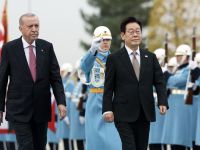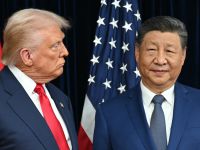Preparations for the first US-Russian summit on US soil since President George W. Bush's move into the White House entered their final phase Thursday, when Russian Foreign Minister Igor Ivanov flew in to iron out remaining differences ahead of the high-stakes parley.
Russian President Vladimir Putin is expected in the United States on November 12 for four days of meetings that will take place in New York, at the White House and at Bush's retreat in Crawford, Texas, where the two leaders will have a chance to finesse their personal relationship in an informal setting.
Ivanov arrived here shortly before midnight Wednesday (0500 GMT Thursday), promising to ensure the success of the summit.
He will meet Thursday with US Secretary of State Colin Powell to, as the Russian minister put it, "synchronize our watches" before the heads of state shake hands.
"I expect they'll have extensive discussions of all the issues in the US-Russia relationship, especially the strategic framework issues of offensive missiles, non-proliferation (and) defensive systems," State Department spokesman Richard Boucher said Wednesday.
Ivanov told reporters the agenda is also likely to include regional issues like the Middle East, where, in his words, Moscow and Washington "are closely interacting and are coordinating their efforts."
But he said he expected his talks with Powell to focus on the antiterrorism campaign launched by the Bush administration in the aftermath of the September 11 terrorist attacks.
"We have an overall positive view of our cooperation against international terrorism and intend to strengthen it in the future," the foreign minister said.
Russia has granted the United States access to its airspace, agreed to the US military's use of Soviet-built bases in Central Asia and offered to share intelligence ahead of US-led military operations in Afghanistan.
Without elaborating, Ivanov said he expected to raise with Powell the issue of "a future arrangement for Afghanistan."
The United States and its allies are trying to cobble together a transitional coalition government for Afghanistan that would replace the radical Taliban regime after its anticipated downfall as a result of the US military campaign.
Powell and Ivanov are also expected to spend much of their time looking for ways to defuse a potential conflict over US plans to deploy a national missile defense system that run counter to the 1972 Anti-Ballistic Missile Treaty.
The Bush administration has threatened to withdraw from the treaty, if the two sides fail to find an accommodation.
But in a departure from his past practice, the Russian foreign minister did not repeat Moscow's standard demand that the ABM Treaty be preserved in its current form.
"We want the US-Russian cooperation in this area to evolve in a manner that would enhance strategic stability," Ivanov stressed.
The toned-down comments came after the Pentagon made a surprise announcement that Defense Secretary Donald Rumsfeld will be heading for Moscow Friday to discuss, among other issues, the future of the ABM Treaty with his Russian counterpart, Sergei Ivanov -- WASHINGTON, (AFP)
© 2001 Al Bawaba (www.albawaba.com)







